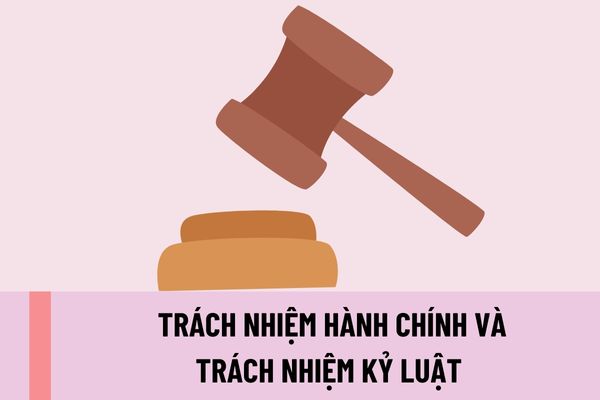Comparison Between Administrative Responsibility and Disciplinary Responsibility: Calculation of Time, Time Limit, and Prescription in Administrative Violation Handling
How to Distinguish Administrative Responsibility and Disciplinary Responsibility?
Based on the provisions in Law on Handling Administrative Violations 2012, Law on Cadres and Civil Servants 2008, Law on Public Employees 2010, and Decree 112/2020/ND-CP
Distinguish administrative responsibility and disciplinary responsibility as follows:
| Criteria | Administrative Responsibility | Disciplinary Responsibility || --- | --- | --- || Definition | Administrative responsibility is understood as the legal consequence for entities committing administrative violations, who must bear responsibility to fulfill obligations prescribed by administrative law and responsibilities arising from violating such obligations. | Disciplinary responsibility is the legal responsibility applied to officials and public employees for disciplinary violations, violations of rules or obligations in public service activities, or violations of the law that do not reach the level of criminal responsibility. || Subjects | Individuals, organizations | Individuals are officials and public employees || Forms of Handling | - Warning;
- Fine;
- Revocation of licenses, practice certificates for a definite period, or temporary suspension of activities;
- Confiscation of administrative violation exhibits, means used to commit administrative violations
- Expulsion.
(Based on Clause 1, Article 21 of the Law on Handling Administrative Violations 2012) | - Reprimand
- Warning
- Salary reduction
- Demotion
- Dismissal
- Forced resignation
- Removal from office
(Based on Article 7 and Article 15 of Decree 112/2020/ND-CP) || Principles of Penalty | - All administrative violations must be detected, promptly prevented and strictly handled, and any consequences caused by administrative violations must be remedied according to the law;
- The handling of administrative violations must be conducted quickly, publicly, objectively, competently, ensuring fairness, and in accordance with the law;
- The handling of administrative violations must be based on the nature, extent, consequences of the violation, the violating subjects, mitigating circumstances, and aggravating circumstances;
- Administrative penalties are only imposed when there is an administrative violation defined by law;
- The person authorized to penalize is responsible for proving the administrative violation. Individuals and organizations sanctioned have the right to prove themselves not committing the administrative violation or through their legal representative;
- For the same administrative violation, the fine amount for organizations is twice the fine amount for individuals.
(Clause 1, Article 3 of the Law on Handling Administrative Violations 2012, point d amended by Clause 2, Article 1 of Amended Law on Handling Administrative Violations 2020) | - Objective, fair; public, transparent; strict, lawful.
- Each violation is only disciplined once with one disciplinary form.
- If officials and public employees commit violations while undergoing disciplinary decisions, the disciplinary forms are applied as follows:
+ If the violation is disciplined in a lighter or equal form to the current disciplinary form, a higher form than the current one is applied;
+ If the violation is disciplined in a heavier form than the current disciplinary form, a higher form than the new violation's disciplinary form is applied.
- When considering disciplinary handling, it must be based on the nature, extent, harm, cause of the violation, aggravating or mitigating circumstances, the attitude of acceptance and correction, remedying the shortcomings, violations, and the consequences caused.
- Administrative penalties or party disciplinary forms cannot replace administrative disciplinary forms; administrative disciplinary handling does not replace criminal prosecution if the violation reaches a level warranting criminal handling.
- If officials and public employees have been disciplined by the party, the administrative disciplinary form must be commensurate with the party's disciplinary level.
- All acts of infringing on the corporal, mental, honor, and dignity during the disciplinary process are strictly prohibited.
- Officials and public employees who commit a first-time violation and are disciplined, if they commit the same violation within 24 months from the effective date of the disciplinary decision, are deemed to reoffend; beyond 24 months, the violation is considered a first-time violation but as an aggravating circumstance in the disciplinary review.
(Article 2 of Decree 112/2020/ND-CP) || Cause of Arising | When a state agency detects a violation, an immediate administrative penalty decision is issued, and the violator must fulfill their administrative responsibility. | When officials and public employees are found to violate legal regulations, the competent authority must issue a disciplinary decision for that individual. |

How do administrative responsibility and disciplinary responsibility differ? How is time calculated in handling administrative violations?
What is the period considered as not being handled for administrative violations?
According to Article 7 of the Law on Handling Administrative Violations 2012, the period considered as not being handled for administrative violations is regulated as follows:
- Individuals and organizations penalized for administrative violations, if within a period of 06 months from the date of completing the penalty decision or 01 year from the date of completing other administrative penalties or from the date of expiration of the enforcement period, do not reoffend, are considered as not being penalized for administrative violations.
- Individuals subjected to administrative measures, if within a period of 02 years from the date of completing the enforcement of administrative measures or 01 year from the date of expiration of the enforcement period do not reoffend, are considered as not being subjected to administrative measures.
How to calculate time, terms, and limitations in handling administrative violations?
According to Article 8 of the Law on Handling Administrative Violations 2012, the method of calculating time, terms, and limitations in handling administrative violations is regulated as follows:
- The method of calculating terms and limitations in handling administrative violations follows the provisions of the Civil Code 2015, except where the Law on Handling Administrative Violations 2012 specifically regulates time by working days.
- Night time is calculated from 10:00 PM of the previous day to 06:00 AM of the following day.
LawNet